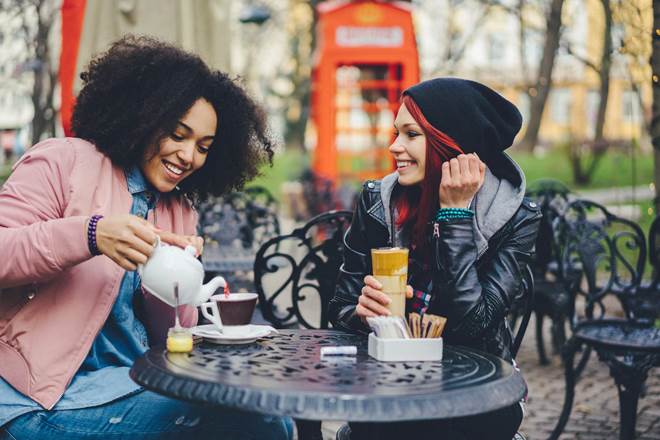Can you imagine a proper English gentleman greeting you with a "Howdy, y’all?"
That’s exactly what you’ll sound like if you say "Ello gov’na" to a British person.
If all you know is the stereotypical British phrases you’ve heard on television shows like Queen Charlotte or on London-based American films, you may be a little behind on your British phrases.
Just as everyone from Arizona doesn’t talk like John Wayne and New Jersey has plenty of folk who don’t sound like Tony Soprano, the British do not exclusively speak like they’re from Peaky Blinders or The Crown.
So before you sound like a "ned" (a non-educated delinquent) using "bloomin'" and "bloody" at afternoon tea in London, know the difference between British slang phrases and common British phrases to leave your new British friends "chuffed to bits" at your correct usage.
Image Credit: Getty Images, lechatnoir
British phrases: a bit confusing, innit?
"Bob’s your uncle" – we’ll send you across the pond with more than "cheerio" in your pockets.
Do British people say 'mate'?
Yes, British people do say "mate." It's a casual and informal way of addressing someone that you know. It could be a friend, coworker, or someone you see regularly. Generally, it’s not as informal as the American "bro" (or British "bruv") but probably not the way you’d want to address a teacher, boss, or police officer.
Why do British people say 'bloody'?
If you’re an American who liberally uses a certain "F" expletive, you’ll be forgiven for assuming that "bloody" is a British alternative. "Bloody" is a degree adverb, akin to words like "very" or "extremely". You could say "It’s bloody cold outside in the winter (or that "It’s brass monkeys outside") or that you’re "bloody angry" at someone, without it being as vulgar as saying the f-word.
How to say 'hi' in British English
As long as you’re polite, feel free to say "Hi" or "Hello" as you normally would. Saying "Hello mate" is equivalent to saying "Hey dude", which is totally fine if you’re friendly with the person. To sound even more authentic you can say "Alright?". This is a contraction of "Are you alright?", but in this case it is a completely neutral phrase, like "What's up?", rather than suggesting there's something wrong with the other person – this sometimes causes confusion for Americans crossing the pond for the first time. You could also naturally say "What’s happening?" or "How you doin'?" (but not like Joey Tribbiani). Again, "Hi" or "Hello" is just fine. "Ello gov’na" is an informal way to address someone instead of saying "Hello sir/ma’am" that comes from the Cockney accent of East London, but this is already becoming quite old-fashioned and might come off as mocking if an American uses it.
Image Credit: Getty Images, Drazen_
Why do British people say 'zed' for the letter 'Z'?
Sorry, my fellow Americans, although we’re technically correct with our "zee", every other country from the British Commonwealth is also correct with their "zeds". "Zed" was first, likely evolving from the Greek zeta to the French zède to the English zed. Just like the tea, Americans dropped the "d" right into the harbor.
Why do the British say 'Happy Christmas'?
Every American Harry Potter fan raised an eyebrow when the Boy Who Lived said “Happy Christmas, Ron” instead of "Merry Christmas". One reason is in the connotations of the words themselves, with "happy" representing more of a feeling and "merry" being more of a behavior. Word around the chimney is that more respectful folk like the royals and religious encouraged "happy" in the UK as it had a more reserved, less intoxicating, connotation. However, "Merry Christmas" is still widely used alongside its more genteel alternative.
Why do the British say 'maths' instead of 'math'?
Alright, scholars, let’s get into it. The British say "maths", not "math", because mathematics is a category of different subjects. There are many "maths" like geometry and algebra. Americans say "math" as a singular term even though mathematics ends in an "s".
Image Credit: Getty Images, Frank van Delft
What are famous British sayings?
Visit Britain and you’ll notice a few famous British sayings like "Fancy a cuppa?" (or "Do you want a cup of tea?") and "Bob’s your uncle" (or "And there it is/it's done") might not come out of every Brit’s mouth. However, a few common British phrases you might hear are "knackered" ("exhausted"), "chuffed" ("thrilled/very happy"), and "ace" (describing something awesome).
What is a very British thing to say?
Americans will giggle at some funny British sayings like "take the piss out of", which has nothing to do with urine but is a popular British phrase for making fun of or teasing someone. Think "I’m just joking" as a similar alternative to "I’m just taking the piss."
What does a British owl say? (This one's for the Ted Lasso fans...)
"Whom, whom." Okay, this might not be a "corker" of a joke (or a real "zinger"), but you might get the mild "Heh" from a fellow Ted Lasso fan. Perhaps give this knock-knock a go at the Ted Lasso filming locations around London for the best audience.
Image Credit: Getty Images, davidf
What do British people say when they ride the rails?
#ICameByTrain – maybe that’s not legit British lingo but it’s our mantra all the same.
Download the Trainline app, explore Great Britain by train, and see how many British slang phrases you can decipher.
Header Image Credit: Getty Images, martin-dm


